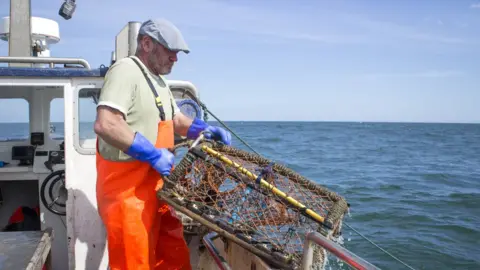Creel fishermen want faster action over trawler ban call
 Getty Images
Getty ImagesCreel fishermen say they are frustrated at slow progress over proposals for a major industry overhaul.
The Scottish Creel Fishermen's Federation (SCFF) commissioned a report into the potential benefits of banning trawlers from inshore waters.
Its findings suggested 400 new boats could join the fleet if a ban covered the first three miles from the shore.
The Scottish government says pilot projects are planned, as well as more research to guide fishing policy.
It also says it does want to develop the inshore fishery.
The SCFF says "little progress" has been made since the report was presented to ministers in May 2017.
Alistair Sinclair from the SCFF said: "Time is of the essence if we are trying to protect the marine environment and the fishermen that make their living from the inshore waters.
"Time is a thing that slips and slips and slips whenever you are negotiating with Marine Scotland. There's always a reason there's a delay and another delay.
"We've attended so many meetings now with no outcome, no reasonable or meaningful outcome, that our frustrations have taken us to the end of the road."
"Any measure that trawls the bottom of the seabed obviously has a damaging impact which will affect all stocks, not just shellfish."
 Getty Images
Getty ImagesThe creel industry says its "low impact, high value" fishing method is better for the environment and say that even a more limited, half-mile ban would be beneficial to local communities, particularly on the west coast.
But such a move is resisted by other sectors of the fishing industry.
The Scottish Fishermen's Federation has insisted the industrial scale method of fishing is sustainable and that trawlermen would be out of business if inshore waters were closed to them.
Bertie Armstrong, chief executive of the Scottish Fishermen's Federation, said: "Last year, the Scottish government made a reasoned response to an advocacy paper from one sector of the Scottish fishing industry calling for another sector to be banned from areas of the coast of Scotland.
"It was noted politely that 'there is more work to be done' and some trials are now planned.
"The arguments made in the paper do not bear much inspection and if executed would be damaging to fishing communities in the west of Scotland."
A Scottish government spokesman said it recognised the importance of creel fishing and already made provision for the sectors, with national quota pools for target stocks.
He added: "We are keen to encourage the development of inshore fisheries, and explore options for sustainable growth. That's why we pushed ahead with inshore fisheries pilots, which we announced in June. Those pilots will test a more localised approach to fisheries management and spatial separation of creel and trawl based fishing.
"We have also commissioned two additional pieces of research - on the economic modelling of Scotland's Norway Lobster fishing grounds; and the other is to determine the depth of Scotland's live langoustine market.
"This research, along with the inshore fisheries pilots, will help inform future fisheries management in Scotland."
